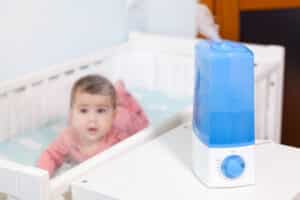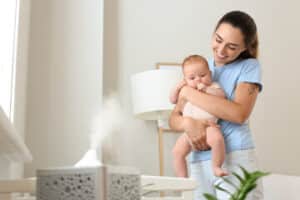An air purifier is a device that removes contaminants from the air. Purifiers are available as standalone units or filters attached to a heating, ventilating and air-conditioning (HVAC) system.
The importance of an Best Air Purifier for a Baby Room cannot be overstated. Babies are particularly susceptible to the effects of pollutants in the air, and an air purifier can help ensure that they breathe clean healthy air.
According to the American Academy of Pediatrics (AAP), “Indoor air pollution is one of the top five environmental health risks.” The AAP recommends that parents take steps to reduce their baby’s exposure to indoor air pollutants, and using an air purifier is one way to do this. In this article, we’ll discuss some of the Best Air Purifier for a Baby Room and how to choose the right one for your needs. Let’sLet’sLet’sLet’s get started!
Effects of air purifier

Air purifiers work by trapping pollutants in a filter or other media, which is very effective. The result is that the air in the room where the purifier is located is much cleaner than the air in other rooms of the house.
There are several important benefits of using an air purifier in a baby’s room.
First, air purifiers can remove harmful contaminants from the air, including dust, pollen, mold spores and pet dander. These pollutants can trigger allergies and asthma attacks in sensitive individuals and exacerbate respiratory problems such as bronchitis and pneumonia.
Second, air purifiers can improve the air quality in a room by removing odors. This is especially important in a baby’s room, where strong odors can cause irritation and discomfort.
Third, air purifiers can help create a more comfortable environment in a room by reducing background noise. This is important for babies and their parents, who may find it difficult to sleep in a room that is too noisy.
Finally, air purifiers can help to improve the overall air quality in a home by reducing the concentration of pollutants in the air. This can significantly impact the home’s occupants’ health and make the home more pleasant to live in.
How Do Air Purifiers Work?

Air purifiers draw air into the unit and pass it through a filter or other media. The air is then circulated back into the room, and the contaminants are trapped in the filter.
There are many different types of air purifiers on the market, and they vary in terms of the type of filter or media used, the size of the unit and the features offered. The three most common types of filters are mechanical filters, activated carbon filters and HEPA filters.
Mechanical filters are the simplest type of filter, and they work by trapping contaminants in a mesh or screen. The advantage of mechanical filters is that they are very effective at removing a wide range of contaminants, including dust, pollen and pet dander.
Activated carbon filters are porous activated carbon, a highly effective adsorbent. Activated carbon filters are particularly good at removing odors, smoke and chemicals from the air.
HEPA filters are the most effective type of filter, and they can remove up to 99.97% of all particles that are 0.3 microns in size or larger. HEPA filters are often used in hospitals and other clean environments and are an excellent choice in a baby’s room.
Benefits of Using an Air Purifier

There are many benefits to using an air purifier in a baby’s room, including:
- Reducing the level of allergens, dust and other pollutants in the air
- Improving the quality of the air by removing odors
- Creating a more comfortable environment by reducing background noise
- Improving the overall air quality in the home
Choosing the Best Air Purifier for a Baby Room

When choosing an air purifier for a baby room, it is important to select a unit specifically designed for this purpose. There are many different types of air purifiers on the market, and not all are equally effective at removing pollutants from the air.
The most important factor to consider when choosing an air purifier for a baby’s room is the baby’s specific needs. If the baby has allergies or asthma, selecting a unit to remove the specific allergens that trigger these conditions is important.
Other factors to consider when choosing an air purifier for a baby room include the size of the unit, the features offered and the price. It is important to select a unit that is appropriate for the size of the room, and it is also important to consider the features that are most important to the family.
The best air purifier for a baby room is one that meets the needs of the baby and the family and is also affordable. There are many different types of air purifiers on the market, so it is important to take the time to compare the different models before making a purchase.
Tips for Maintaining an Air Purifier

There are a few simple tips that can help to keep an air purifier in good working condition, including:
Changing the filter regularly
Most air purifiers come with replaceable filters, so it is important to change them regularly. The frequency of filter changes will vary depending on the filter used, but it is generally recommended to change the filter every three months.
Cleaning the unit regularly
It is also important to clean the air purifier regularly. Most units come with a cleaning brush or cloth; it is important to use this to remove dust and other particles from the unit.
Storing the unit properly
When the air purifier is not in use, it is important to store it in a cool, dry place. Keeping the unit away from direct sunlight and heat sources is also important.
Following these simple tips can help ensure that an air purifier remains in good working condition and continues to provide the benefits it is designed to provide.
FAQs
Here are some frequently asked questions about air purifiers:
Do Air Purifiers Use a Lot of Electricity?
No, air purifiers are not big power users. Most units use less than 100 watts of power, which is about the same as a standard light bulb.
How Often Do I Need to Change the Filter on My Air Purifier?
The frequency of filter changes will vary depending on the filter used, but it is generally recommended to change the filter every three months.
Can I Use an Air Purifier if I Have Asthma or Allergies?
Yes, air purifiers can benefit people suffering from asthma or allergies. If the baby has allergies or asthma, selecting a unit to remove the specific allergens that trigger these conditions is important.
Do Air Purifiers Make Noise?
Some air purifiers make noise, but most units are very quiet. Many units are so quiet that they can be used in a baby’s room without disturbing sleep.
How Much Do Air Purifiers Cost?
Air purifiers vary in price, depending on the features they offer and the size of the unit. Most units range in price from $50 to $200.
The Final Words
In this article, we have discussed air purifiers and provided tips on choosing and maintaining them. We hope that this information will be helpful to you in making the best decision for your family. Thanks for reading!
Please comment below if you have any questions left. Moreover, if you found this article helpful, share our website AirCleansy with your friends and family. We are dedicated to helping people improve the air quality in their homes and would love for as many people as possible to learn about us.

